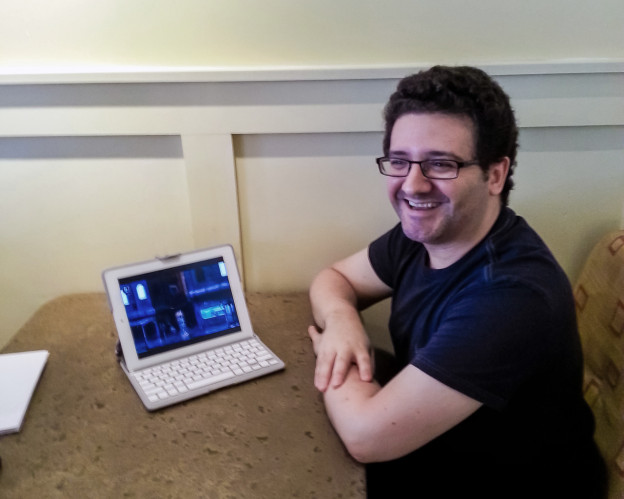This week, Wadjet Eye founder Dave Gilbert is in the Matt Chat seat, spilling his guts about his career as a developer and publisher of point-and-click adventure games. Dave works extensively with Adventure Game Studio, a free, easy-to-use tool for making games in the style of Monkey Island and Day of the Tentacle. Dave has taken the genre in intriguing new directions, beginning with his first game The Shivah, which puts players in the shoes of a rabbi. Be sure to see below the fold for my extended thoughts on the “freeware vs. commercial” part of our discussion.
mattchat211
I really enjoyed this interview with Dave. Like most adventure game developers I’ve talked to over the years, Dave is a natural storyteller. I was particularly intrigued by his discussion of the AGS community, and how he took some criticism for “daring” to sell his game rather than make it available for free. I’ve encountered similar attitudes from some folks who watch my show. People get used to watching YouTube content for free, so the idea that somebody is asking them for money strikes them as greedy somehow. I was struck when looking at the AGS website at the huge number of games they have available there for free. Obviously, when there’s so many great games you can download for nothing, you would have to wonder why someone else is trying to charge for his.
There’s also the “issue” that AGS itself is freeware. Would Dave and his fellow AGS fans have made their games if they’d had to pay for AGS? It’s hard to say. But it’s probably also telling that the original developer, Chris Jones, eventually tired of the project, but (thankfully) released the source code so that others could carry on its development. Perhaps if Chris had offered some kind of “premium” option, or charged for licensing of commercial titles, or the like–he would have stuck with it. After all, it’s one thing to abandon a hobby, another to abandon a revenue stream (no matter how small).
Whenever I think about this issue, I think about Harlan Ellison’s rather obnoxious interview: Pay the Writer. Ellison is unwilling even to give interviews for free. Obviously, I wouldn’t be doing these videos if my guests insisted on being paid for their time, and I disagree strongly that Ellison “gets nothing” when folks like Warner Bros. show his interview. He gets his name out there; he gets a platform upon which to speak; he gets to give his own version of his story, and, assuming people like what he says, he gets power and prestige. That’s far from “nothing!” Indeed, imagine how many struggling authors out there would gladly pay to be interviewed in a newspaper, magazine, or high-profile website!
I encountered a similar attitude at a sci-fi authors’ panel I attended at USF in 2005. Piers Anthony, Harry Harrison, and Joe Haldeman were the guests. I can’t remember which panelist said it, but one of them went on about how upset he was that so many authors were posting their work online for free. “Never write anything for free!” was his stern advice. “That cheapens the profession! Keep that up, and we’ll all be out of business.” I had to laugh at this. The very idea that an amateur author posting his unpublished manuscript online is going to destroy the industry–ha!
In short, I think working for free–whether it’s making YouTube videos or adventure games–is a great thing. If your engine is powered by the fumes of raw passion for the activity, good for you. But when someone decides to charge for his games or ask for donations, you need to respect that. After all, you don’t have to own the game or watch the video if you don’t think it’s worth it.
Clearly, If Dave had put his game up for sale and only managed to sell a half-dozen copies, he’d have had to rethink his business plan. Fortunately, his games have done much better than that, and his income has even allowed him to publish the works of other aspiring designers like himself. Far, far from criticizing the man for earning money for his work, I applaud his willingness to take risks and make a real difference.

I don’t know. I think I’m pretty torn on the whole “work for free” mentality.
As a free market capitalist, I always think that competition, in this case competition from young and eager writers/game debs/artists/etc., is always good for the consumer. It helps drive innovation, makes great products more accessible, and pushes everyone involved in the industry to be better as a whole.
However, I have to agree that practically giving away your product or service does make it that much harder to make a living off of one’s work. I guess I’m glad I work in an industry that has barriers to entry (some worthwhile and others not so much), but I’d shudder to think of how difficult it is to make a living in the industries where the only barrier is creativity.
I think that’d be something to explore in a future podcast.